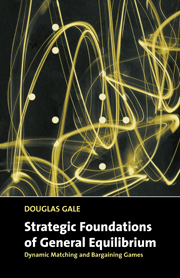3 - Continuity and anonymity
Published online by Cambridge University Press: 22 September 2009
Summary
Chapter 2 presented a theory of dynamic matching and bargaining games (DMBG) with a finite number of agents. This theory is more difficult than the corresponding theory for a continuum economy, chiefly because of the strategic problems that arise in finite games. The theory of bargaining deals with small numbers of players, usually only two, and strategic issues arising in these sorts of bargaining problems have been exhaustively studied. Bargaining in markets with a large but finite number of agents is still relatively unexplored territory, however. One of the few papers dealing with this topic is the innovative and imaginative paper of Rubinstein and Wolinsky (1990). It is well worth reviewing the results in this paper because they reinforce the lessons drawn from chapter 2 about the importance of Markov strategies, anonymity, and continuity.
Rubinstein and Wolinsky (1990)
Rubinstein and Wolinsky (1990, hereafter RW) contains a rich array of models, illustrating the importance of different informational and institutional assumptions in the analysis of DMBG. As a benchmark, RW begins with a model in which the matching process is exogenous. There are S sellers and B > S buyers in the market. Each seller has one unit of an indivisible good which is worth nothing to him. Each buyer wants to buy at most one unit of the indivisible good, which is worth one dollar to him.
Information
- Type
- Chapter
- Information
- Strategic Foundations of General EquilibriumDynamic Matching and Bargaining Games, pp. 110 - 156Publisher: Cambridge University PressPrint publication year: 2000
